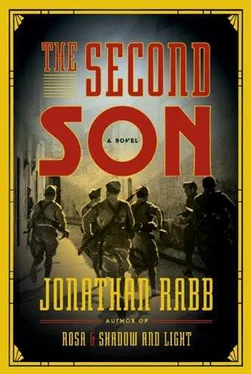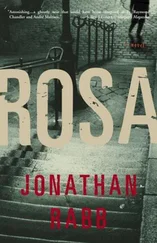Jonathan Rabb - The Second Son
Здесь есть возможность читать онлайн «Jonathan Rabb - The Second Son» весь текст электронной книги совершенно бесплатно (целиком полную версию без сокращений). В некоторых случаях можно слушать аудио, скачать через торрент в формате fb2 и присутствует краткое содержание. Жанр: Политический детектив, на английском языке. Описание произведения, (предисловие) а так же отзывы посетителей доступны на портале библиотеки ЛибКат.
- Название:The Second Son
- Автор:
- Жанр:
- Год:неизвестен
- ISBN:нет данных
- Рейтинг книги:4 / 5. Голосов: 1
-
Избранное:Добавить в избранное
- Отзывы:
-
Ваша оценка:
- 80
- 1
- 2
- 3
- 4
- 5
The Second Son: краткое содержание, описание и аннотация
Предлагаем к чтению аннотацию, описание, краткое содержание или предисловие (зависит от того, что написал сам автор книги «The Second Son»). Если вы не нашли необходимую информацию о книге — напишите в комментариях, мы постараемся отыскать её.
The Second Son — читать онлайн бесплатно полную книгу (весь текст) целиком
Ниже представлен текст книги, разбитый по страницам. Система сохранения места последней прочитанной страницы, позволяет с удобством читать онлайн бесплатно книгу «The Second Son», без необходимости каждый раз заново искать на чём Вы остановились. Поставьте закладку, и сможете в любой момент перейти на страницу, на которой закончили чтение.
Интервал:
Закладка:
Henkel’s smile grew. “Never took you for an elitist, Nikolai.”
Hoffner picked up the last of the pads. “I’m not. I just like a bit of schooling. Your uniform can be rather misleading on that.”
Henkel snorted a quiet laugh and stepped farther into the office. “My God, you’re getting out just in time, aren’t you?”
“Too late to turn me in, then?”
“Not my style.” Henkel settled in one of the chairs along the wall.
Hoffner continued to flip through his pad. A photograph of Martha with Sascha at five or six years of age had somehow wedged itself into the pages. It was a dour-looking thing, mother and son both moodily sunburnt, probably taken at the beach one of those summers before Georg had come along. Still, she had been pretty.
Hoffner slid the photo back in and placed the pad in the crate. He looked over at Henkel. “Not your style? You might want to ask yourself why sometime.”
Henkel spoke easily. “That was your generation, Nikolai. It’s answers now, not questions.”
Again Hoffner bobbed a nod. “Is that meant to be clever or charming? I’m never quite sure with all these new rules.”
Henkel looked momentarily less charmed before the smile returned. “I’d never really taken you for a Jew.”
How quickly word traveled, thought Hoffner. “Neither had I,” he said. “But that’s just it. Your boys have left me no choice.”
“Early pension, and at full pay? They’re actually doing you a favor at the moment.”
“It’s not this moment that worries me.”
Henkel snorted another laugh. “Gloom and doom. I was wrong. You really are a Jew.” When Hoffner said nothing, Henkel pressed. “Oh, come on, Nikolai, don’t take it so personally. No one’s going to let an old bull cop like you get caught up in any of this.” The humane Henkel was making an appearance. “It’s just putting things in order. They make a show with a few of the more arrogant types, and then everyone settles in. Better for the Jews to live their own lives, anyway. Probably what they want themselves.” He smiled. “Now, if you happened to own a shop or, God forbid, actually had a little money, then…”
Hoffner tossed another handful of scraps into the wastebasket. “I might need to take it a bit more personally?”
“No, Nikolai, you wouldn’t.” Henkel leaned forward. “This is politics. They’re saying what they know people want to hear. So they’ve taken it a bit far. They’ll pull back. Trust me, six months from now, no one will be talking about any of this.”
Hoffner swept the remaining clips into his hand and deposited them in his pocket. “They,” he said, as he brushed the grit from his palms. “Your friends might not like hearing that from someone wearing their uniform.”
Hoffner thought he might have overstepped the line but Henkel was in too good a mood. “It’s me, Nikolai,” Henkel said, sitting back again. “I’m the one who’s getting it. I’ll probably have to bring in a fumigator, but who wouldn’t want the great Nikolai Hoffner’s office? There was quite a pool for it. Somehow I won.”
For the first time, Hoffner smiled. “Somehow,” he said. He took his hat from the rack. “Then I suppose it’s yours to enjoy.”
He started for the door, and Henkel said, “You’re forgetting your crate, Nikolai.”
Hoffner stopped and looked back. He stepped over and pulled out a pen. Scratching out the word “desk,” he wrote “trash” below it. He then pocketed the pen and moved out into the hall.
It had taken some getting used to, living among the refined. Even now, Hoffner could feel the eyes from across the street with their tidy disdain-sneering at the brown suit, brown hat, brown shoes. Brown was not a shade for the rich, at least not the brown Hoffner was sporting. Still, it was good to have a successful son. Georg’s house was large, his lawn well-kept, and his flowers always a jaunty yellow or maroon, even after too much rain: remarkable how wealth could absorb even the dullest of colors.
The one blemish on the otherwise flawless facade was a tiny streak of fresh paint on the doorjamb. Hoffner stepped up to the veranda, lowered his umbrella, and stared at the spot where the mezuzah had hung. Not that Georg had grown up with anything remotely Jewish-he had grown up with nothing-but the boy had fallen in love with a girl, and such girls demanded these things. She had even gone so far as to demand (ask, hope) that Georg might move himself up on the Judaic ledger from quarter Jew to full-fledged. Only twenty at the time, Georg had submitted without a blink, a year’s worth of preparation happily weathered to make him fit for marriage. Hoffner was now sandwiched between a dead mother and a practicing son, both of whom had returned to their roots without a single thought to the living family tree. Odd how, thus far, Hoffner was the only one to have paid for his lineage.
The mezuzah had come down after the latest spate of street beatings. Until recently, the punch-ups had always taken place in the seedier parts of town or outside synagogues. Even so, all but a few of the houses along the street were now festooned in swastika flags: national pride, they said, the German Olympic spirit on display. Those conspicuously unadorned-the Nazis had forbidden Jews from flying the Reich colors-drew stares enough. Why advertise beyond the obvious?
Hoffner pushed through the front door and into the foyer. He slid his umbrella into the stand and then opened the door to the house. Almost at once the smell of boiled chicken and potatoes wafted out to meet him.
Luckily, Georg’s Lotte was an excellent cook. Hoffner followed the smell past the sitting and dining rooms (too much velvet and suede), along the carpeted corridor (very Chinese), and into the white-white tile of the kitchen. At least here there was something of the familiar. Lotte was at the stove, standing beyond the large wooden table and leaning over a pot that seemed to be sending up smoke signals. Very quietly, Hoffner said, “Hello.”
She was known to jump. Several meals during his early days in the house had spilled to the floor with the simplest of greetings. Hoffner cleared his throat and again spoke in a calming tone. “Smells very nice.”
“I heard the door,” she said, without turning. She continued to stir. “A messenger came with another note. That makes three. It’s on the table.”
Hoffner saw the ripped-open envelope with the now-familiar Pathe Gazette rooster in the top corner. The note was stuck halfway back in.
“And?” he said, pulling out a chair and sitting.
She seemed to take comfort in the heat on her face. “They don’t feel there’s any need for alarm, at this point.” The last phrase held just the right touch of resentment. “ ‘It’s mayhem,’ ‘what Georg thrives on,’ ‘the only one who can get it on film,’ so forth and so on.” She dug through for a piece of something, scooped it up, and tossed it into the sink. “They’re doing what they always do. They’re being pricks.”
Hoffner liked this most about Lotte. In fact, he liked almost everything about her. She was lovely and fine-boned, very good to Georg, and so clever when it came to seeing things as they really were. Georg had needed a girl like this, a girl just as clever as himself. And while Georg might have had a bit more empathy for the world beyond them-Lotte was never one to suffer fools-it was only a bit. By some miracle, the world had allowed them to find each other.
It was her mouth, though, that Hoffner marveled at. There was an honesty to the way she used words like “prick” and “shit-brain.” They weren’t meant to shock, just define. Hoffner imagined it was her precision that made her so endearing.
Читать дальшеИнтервал:
Закладка:
Похожие книги на «The Second Son»
Представляем Вашему вниманию похожие книги на «The Second Son» списком для выбора. Мы отобрали схожую по названию и смыслу литературу в надежде предоставить читателям больше вариантов отыскать новые, интересные, ещё непрочитанные произведения.
Обсуждение, отзывы о книге «The Second Son» и просто собственные мнения читателей. Оставьте ваши комментарии, напишите, что Вы думаете о произведении, его смысле или главных героях. Укажите что конкретно понравилось, а что нет, и почему Вы так считаете.












